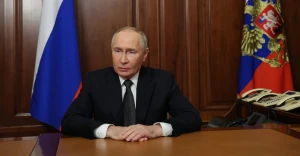
Russia openly talks about conquering Europe
Ukraine's allies should consider mobilization measures for the "security belt" along borders closer to Russia
The commander of the Russian Center group of troops, Andrey Mordvichev, on the duration of the war, "If we are talking about Eastern Europe, which we will have to... Of course, it will be prolonged. [Ukraine is only an intermediate stage?] Yes, absolutely right. This is just the beginning.”
* * *
The commander of a group of troops is not a military blogger or a participant in Skabeyeva's show. And if a representative of the military command of the aggressor country states on the official media that the timing of the military campaign is determined by the task of conquering Eastern Europe beyond the borders of Ukraine, then this should be taken as a real applied task within the framework of the new military doctrine of the Russian Federation.
"Whether this task will be solved or not, it has obviously been set. And Polish officials (including the Minister of Defense and the Ambassador to France) have already publicly responded to the threats. The Baltic states have been increasing their mobilization since the beginning and are now actively reducing the number of Russian agents by deporting them back."
Romania should also take into account the recent nonsensical statement by a known Kremlin sympathizer, Șoșoacă, suggesting that the state should disregard any armed incidents involving Russia. This statement could be interpreted as a guarantee that there will be more Russian missiles and drones over Romania, with possible destruction and casualties. Accordingly, Romania should mobilize to protect its borders.
Dmitry Medvedev is, of course, an alcoholic and an idiot, but he is also the deputy head of the Russian Security Council and the first deputy head of the Military-Industrial Commission. And his statement about the need to "suspend Russia's diplomatic relations with the EU" with the threat that "embassies will be evacuated before very specific events" should at least be taken into account when assessing the general mood in the Kremlin.
This emphasizes the importance of not only supporting the Ukrainian Armed Forces in their autumn counteroffensive but also the necessity to intensify, rather than decrease, the substantial assistance provided to Ukraine by its allies. There is no guarantee that someone hasn't given Putin an enticing idea for his election campaign before March 17, 2024. If the goal is to fuel patriotism and rally support through a "new domestic war," it might be deemed more epic to engage in a confrontation with the entirety of "decadent Europe" rather than "deprived of its own resources" Ukraine.
"This is more beneficial from a propaganda point of view, because no one will expect any victories here: on the contrary, there will be total self-sacrifice of the "suffering people" and absolute support for the tsar."
There is no practical need for such an inflammation - Putin is already supported by a sufficient number of Russians, even without much strain on administrative resources. But the idea is definitely tempting in Putin's worldview.
Conclusion: The allies should consider not only mobilization measures for the "security belt" along the borders closer to Russia, but also contemplate the possibility of initiating a substantial economic and military intervention. Preventing Putin from taking undesirable actions is unquestionably safer than dealing with the consequences. While the military capabilities of the EU and the United States have indeed been rejuvenated by supplying outdated resources to Ukraine, their economies, along with sectors like science, education, and demographics, have benefited from new and expanded military contracts filling their warehouses. But the point should be made in time.
About the author. Oleksiy Holobutsky, political scientist.
The editors don't always share the opinions expressed by the authors of the blogs.
- News













































